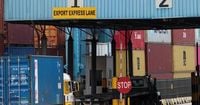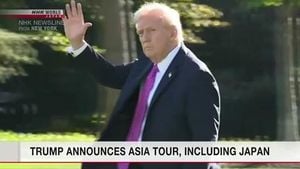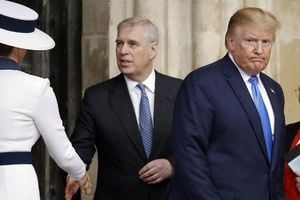The African Growth and Opportunity Act (AGOA), a trade agreement that has shaped U.S.-Africa relations for a quarter-century, now stands at a critical crossroads. On September 30, 2025, the Trump administration signaled support for a one-year extension of this landmark legislation, just as it was set to expire. The move, while offering a temporary lifeline, comes amid escalating uncertainty and mounting pressure from African leaders, investors, and U.S. lawmakers who see AGOA as a crucial—if imperfect—pillar of economic cooperation between the two continents.
Enacted in 2000, AGOA was designed to grant duty-free access to the U.S. market for a wide array of products from eligible sub-Saharan African nations. Over the years, it has allowed more than 1,800 products to enter the United States without tariffs, boosting trans-Atlantic trade and supporting hundreds of thousands of jobs across Africa. According to Bloomberg, 32 African countries remain eligible for its benefits in 2024, with AGOA credited for sustaining industries from textiles in Kenya to metals in South Africa.
Yet, despite its initial promise, the agreement’s future has been clouded by political wrangling and shifting global dynamics. Originally extended through 2025 under bipartisan legislation passed a decade ago, AGOA’s benefits have been eroded by a new wave of U.S. tariffs. The Trump administration’s imposition of country-specific duties—ranging from 10% to 30%—has hit African exporters hard, undermining the very advantages AGOA was meant to provide. As BBC reported, "The deal has been undermined by American tariffs and unanswered pleas by African leaders for extension."
Complicating matters further, the agreement’s expiration date landed at a moment of heightened competition for influence on the African continent. With China and several Gulf nations ramping up their trade and investment, a lapse in AGOA would signal, as Semafor noted, "that the Trump administration is disengaging with Africa at a time when other global powers... are ramping up their presence across the continent."
African leaders have not been silent. Kenyan President William Ruto, South African President Cyril Ramaphosa, and Lesotho’s trade minister have all publicly urged Washington to extend the program. Their appeals have been echoed by investors and trade officials, who warn that a sudden end to AGOA could trigger steep economic losses. The International Trade Centre (ITC) in Geneva has cautioned that the program’s lapse could result in a "major drop" in apparel and tuna exports from Kenya, Tanzania, Cape Verde, Lesotho, and Eswatini. For South Africa—the continent’s largest economy—a 17% decline in shipments is projected, with metals, vehicles, and chemicals bearing the brunt.
"AGOA supports hundreds of thousands of jobs in more than 30 eligible countries," a White House official told TRT World, highlighting the program’s role in job creation and economic stability. But the official also acknowledged that AGOA’s impact has been "diluted by the bilateral tariffs Trump introduced in August, which exposed products once exported duty-free under AGOA to US import taxes of between 10% and 30%."
Lobbying for AGOA’s extension has reached fever pitch in recent weeks. African governments and investors have pushed for a one- or two-year extension after efforts to secure a longer-term renewal failed to reach a congressional vote. The only realistic path for extension, according to U.S. News, is to attach the measure to a stopgap funding bill aimed at keeping the U.S. government open past September 30. If that gambit fails, there remains a possibility that AGOA could be reinstated later, but the uncertainty is already taking a toll on business confidence.
For many African nations, the stakes are enormous. The ITC warns that, without AGOA, sectors that have thrived under the agreement could face rapid contraction. Kenya’s apparel and tuna industries, for instance, have built their export strategies around duty-free access to the U.S. market. Lesotho and Eswatini, small economies heavily reliant on textile exports, could see factories shutter and jobs evaporate almost overnight. Cape Verde and Tanzania face similar risks, with fragile supply chains vulnerable to even brief disruptions in trade preferences.
South Africa’s predicament is particularly stark. The country’s shipments to the U.S.—once a source of pride and a driver of industrial growth—now face the prospect of a 17% plunge, according to Bloomberg. The losses are expected to be concentrated in metals, vehicles, and chemicals, sectors that have already been battered by global competition and softening demand.
Yet, not every country stands to lose. Angola, one of Africa’s top oil producers, has been exempted from the new U.S. tariff measures, potentially giving it a competitive edge in energy exports. Senegal, too, finds itself in a stronger position thanks to its exports of titanium and zirconium. As the third-largest supplier of zirconium to the U.S.—behind South Africa and Australia—Senegal may actually benefit from higher levies imposed on its competitors. The ITC suggests that "this could improve Senegal’s competitiveness despite softer U.S. demand."
The shifting fortunes among African nations underscore the complex legacy of AGOA. While the agreement has fostered economic growth and job creation, its benefits have not been evenly distributed. Over the years, China’s rise as a global exporter has further eroded Africa’s share of the U.S. market, intensifying the need for a more robust and equitable trade framework.
In Washington, the debate over AGOA’s future has exposed both bipartisan support and deep divisions. Many lawmakers recognize the strategic importance of the agreement—not only as an economic tool but also as a means to counter Chinese influence in Africa and diversify U.S. supply chains. However, political gridlock and competing priorities have made it difficult to secure a long-term renewal. As one White House official put it, "Despite broad bipartisan support for renewing AGOA... the law's prospects for extension before it lapses are deeply uncertain."
The uncertainty has left African exporters, U.S. importers, and global investors in limbo. For now, the Trump administration’s backing of a one-year extension offers a temporary reprieve, but it is far from the comprehensive solution many had hoped for. As the deadline loomed, African governments and businesses watched anxiously, aware that the fate of AGOA could shape the continent’s economic trajectory for years to come.
With the world’s eyes on Washington, the next chapter in U.S.-Africa trade relations remains unwritten. The outcome will not only determine the future of AGOA but also signal the broader direction of American engagement with Africa in an era of rising global competition and shifting alliances.




